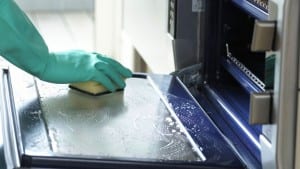Cleaning Your Oven With Baking Soda
As the UK’s largest oven cleaning franchise, we know the best way to clean ovens with baking soda. You may have learned about this combination as early as nursery school, where it is often used to introduce kids to the concept of chemical reactions in a harmless environment.
Oven cleaning hacks using baking soda and vinegar find their roots in Chemistry. When vinegar (an acid) and baking soda (a base) meet, they chemically react together, resulting in bubbles and foam.
In the first reaction, the acid-based reaction, hydrogen ions in the vinegar react with the sodium and bicarbonate ions in the baking soda. This results in two new compounds: carbonic acid and sodium acetate.
In the second reaction, which is the decomposition reaction, the freshly produced carbonic acid decomposes into water and carbon dioxide gas, causing bubbles and foam to arise.
Using this recipe for cleaning oven with baking soda and vinegar can help loosen grease and grime from the inside of your oven, making it easier to remove. Although not as effective as professional oven cleaning, this is a wat to clean the oven naturally overnight.
Related: best way to clean oven glass
Is Baking soda in ovens dangerous?
Please note that these instructions are for cleaning the inside of an empty oven. Please ensure that all baking soda residue is completely removed before you use the oven to cook again. Baking soda remains left on heating elements can cause smoke, so please ensure all baking soda is removed from the oven.
See our ultimate guide on how to clean your oven, for a complete overview of everything you need to know about oven cleaning.

How to Clean Your Oven with Baking Soda and Vinegar
- Gather seven tablespoons of baking soda (bi carb), 200ml of vinegar and four tablespoons water. Empty the oven completely, setting any trays, racks and oven dishes aside.
- Scrape Out the Loose Build-Up and prepare your vinegar. Pour your vinegar into a spray bottle. Scrape out any crumbs or burnt bits of food in the oven, with a spatula.
- Create a baking soda (bicarb) cleaning paste. To form your bicarb (baking soda) paste, in a regular bowl, mix seven tablespoons of baking soda (bicarbonate of soda) with three tablespoons of water until you have a spreadable cleaning paste. If you have a rather large oven or if you’re cleaning multiple ovens at once, you may consider doubling – or even tripling – the amounts. Don’t worry if your paste is not 100% consistent in texture.
- Coat the inside of your oven with the paste and leave overnight: Next, get your household gloves out and coat the inside surfaces with a sponge, using your hands and fingers to really get the paste into every nook and cranny. Pay extra attention to particularly greasy areas. As you rub in the paste, you’ll notice it will turn a brownish colour from the grime it is absorbing, so make sure your hands, arms and clothes are protected. Warning: make sure to steer clear of the heating elements when applying the paste.
- Let the Paste Sit Overnight: As some of the grease and grime inside your oven may be rather stubborn, leaving the baking soda paste to sit for at least 12 hours will produce the best results. Whilst this magical mixture does its job, you can get on with your day or have a good night’s rest.
- Wipe up the baking soda Paste: After the 12-hour work-in period, put on your household gloves again, take a damp dishcloth and wipe out the dried paste as good as you can; consider using a spatula to scrape the paste out of hard-to-reach corners. If you do use a spatula, make sure it’s a soft plastic or wooden one so it doesn’t scratch your oven.
- A Final Clean with Vinegar: Spray your vinegar onto the inside oven surfaces. The chemical reaction between the vinegar and the baking soda will produce foam and bubbles, which will loosen the leftover grime and identify any residue of paste.
- The Final Wipe Down: Take a damp dishcloth and wipe down any remaining foamy areas of the oven. Spray and wipe away the vinegar until your oven looks as clean as new.
Cleaning your oven with baking soda can be a lot of work to be doing on a regular basis. If you would like a professional deep clean that will restore your oven to near-showroom condition with zero time and effort from your part, feel free to get in touch with Ovenu – our experienced technicians will do all the hard work for you!
Related: How to Clean Oven Racks
Bi carb soda for cleaning
Sprinkle baking soda on built-on grease, spray the affected area with water, leave the bi carb to foam and sit for at least 10 minutes. Scrub the area using a microfibre cloth or toothbrush to wipe away any remaining dirt.
FAQs
Can you use baking powder to clean the oven?
You can use baking powder to clean the oven, in the same way that you use baking soda. Baking powder, like baking soda, contains bicarbonate of soda, with the addition of an acid which is used as a raising agent. Baking powder will have the same chemical reaction with water as baking soda.
Can you clean oven with bicarb?
You can clean the oven with bicarb (bicarbonate of soda). Sodium bicarbonate is the chemical name for baking soda. Mix it with water or vinegar to make a paste. Spread the paste over the oven and then spritz with vinegar to further activate the chemical and lift grease and grime.
Can you clean your oven with baking soda?
Also known as bicarbonate of soda, baking soda is easy-to-use, non-toxic, affordable and effective at cleaning oven grease. Baking soda is alkaline and baked on grease and foods are acidic meaning baking soda is effective at breaking down grease, making it easy for you to wipe it up.
Can you clean an oven with bicarbonate of soda and vinegar?
You can clean an oven with bicarbonate of soda and vinegar. Combining these two household items is the best way to harness the chemical reaction and lift burnt on grease or stains. Either create a paste using both or scatter bicarbonate of soda across the oven and then sprits with a 3:1 vinegar and water solution to activate the chemicals.
Is there a natural way to clean the oven?
Using baking soda and vinegar is a natural way to clean the oven. Both items combine to create a chemical reaction that, although an effective cleaning agent, doesn’t have any adverse effects. By sprinkling baking soda over affected areas and spritzing with vinegar you can penetrate difficult to reach parts of the oven, without the use of chemicals.
Can you clean oven door with baking soda and vinegar?
The oven door can be cleaned using baking soda and vinegar. Scatter baking soda across the surface of the door and then spritz with vinegar. Allow the reaction to fizz and work away at grime before wiping away with a cloth. This is a good method for the outside of your oven door, but you may need to resort to other methods to clean the inside of your oven door.
How to clean oven glass with baking soda and vinegar?
Clean oven glass with baking soda and vinegar by first creating a paste with baking soda and water. Spread the paste across the affected oven glass and leave or 10 minutes. Return with a spray gun filled with a vinegar/water solution and spritz the paste to create the fizzing reaction. Scrub away any residue with a non-scratch sponge and then shine with a microfibre cloth.
Baking powder or bicarbonate of soda for cleaning?
For cleaning, use bicarbonate of soda (baking soda) as it’s non-toxic easy-to-use and effective at fighting baked on grease and food. The difference between baking powder and baking soda is that baking powder is bicarbonate of soda with cream of tartar added to it, this acts as a raising agent for baking purposes.
